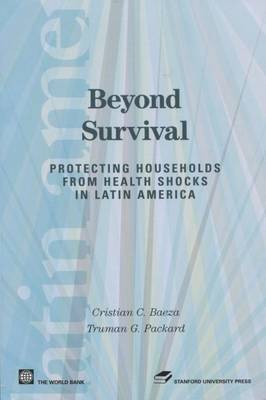Latin American Development Forum
2 total works
Keeping the Promise of Social Security in Latin America
by Indermit S Gill and Truman G Packard
Published 30 September 2004
Empirical analysis of two decades of pioneering pension and social security reform in Latin America and the Caribbean shows that much has been achieved, but that critical challenges remain. In tackling this unfinished agenda, a great deal can be learned from the reform experience of countries in the region. Keeping the Promise, produced by the chief economist's office in the Latin America and Caribbean Region at the World Bank, evaluates policy reforms in 12 countries, points to successes and shortcomings, and proposes priorities and options for future reform. ""Keeping the Promise provides a timely assessment of two decades of pension reform experience-with a wealth of new data, and empirical evaluation of reformed social security systems. Many economists and policymakers will not be persuaded by some of the main conclusions and recommendations-such as the supposed failure to increase coverage, and the call for strengthening a pay-as-you-go defined-benefit scheme for poverty prevention-but they will welcome the book's critical appraisal. This is required reading for pension specialists and policymakers in Latin America and beyond.""-Klaus Schmidt-Hebbel, Chief of Economic Research, Central Bank of Chile ""A heavyweight analysis of the Latin American pension revolution which raises important questions about the optimal scale of compulsory saving when redesigning pension systems. "" -Paul Wallace, The Economist
Beyond Survival: Protecting Households from Health Shocks in Latin America breaks new ground in the ongoing debate about health finance and financial protection from the costs of health care. The evidence and discussion support the need to consider financial protection, in addition to health status, as a policy objective when setting priorities for health systems. This book reviews the Latin American experience with health reform in the last 20 years and the fundamentals of health system financing, using new evidence to show the magnitude and mechanisms that determine the impoverishing effects of health events (diseases, accidents, and those of the life cycle). It provides options for policy makers on how to protect, and help households to protect themselves, against this impoverishment. The authors use empirical evidence from six case studies commissioned for this report, on Argentina, Chile, Columbia, Ecuador, Honduras, and Mexico. This book provides policy makers with a solid conceptual basis for decisions on the contents of mandatory health insurance benefit packages, choices of financing mechanisms, and the roles of public policy in this field.
Beyond Survival provides an in-depth analysis of, and organizational alternatives for, risk pooling and health insurance for financial protection. It analyzes the urgent need to extend risk pooling to the informal sector, the challenges for current social insurance arrangements, and options for policy makers to effectively extend risk pooling to the informal sector.
Beyond Survival provides an in-depth analysis of, and organizational alternatives for, risk pooling and health insurance for financial protection. It analyzes the urgent need to extend risk pooling to the informal sector, the challenges for current social insurance arrangements, and options for policy makers to effectively extend risk pooling to the informal sector.

